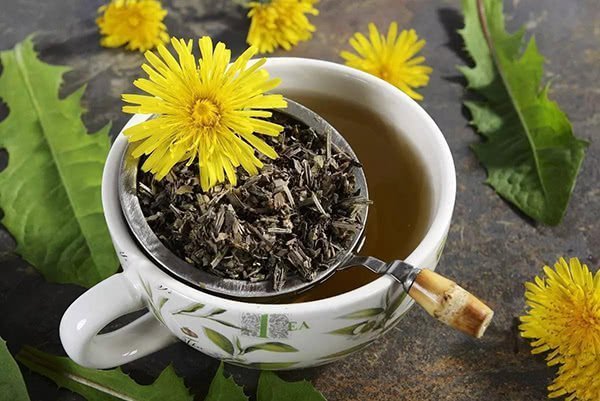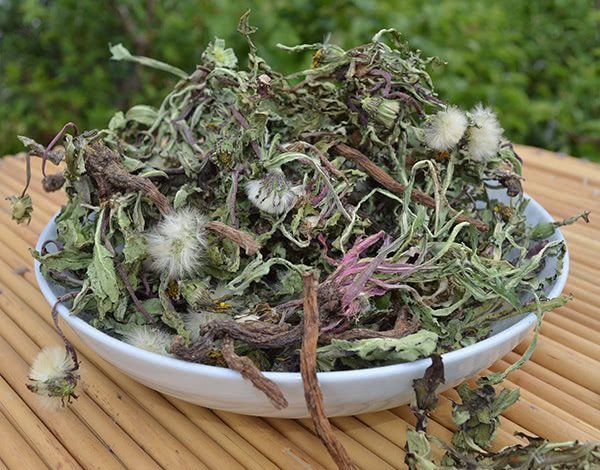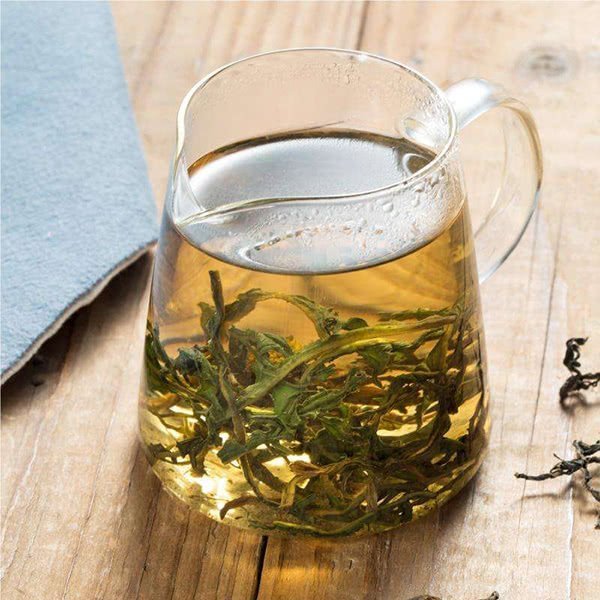But just like the elderflower, dandelion is also a kind of great weed that can be used to make a cup of herbal tea with lots of benefits.
Dandelion (Taraxacum Officinale). In some folk remedies, dandelion tea was used to treat and prevent various diseases.
What Is Dandelion Tea
There are two types of dandelion tea commonly discussed:- Drying the dandelion leaves, flowers, and roots, steep in hot water, then drink. That is also the most popular DIY way in folks to make dandelion tea.
- Only take the dandelion root, cut in pieces, steep them after roasting. Roasted dandelion root tea is loved on the market and is said to be a great alternative to coffee because it has the same color, less bitter taste, and it’s caffeine-free.
While the taste of dandelion tea may not be for everyone, this disadvantage doesn’t stop us from loving it when we learn about its benefits.
Dandelion Tea Benefits
Dandelions are rich in vitamins A, C, and D, lots of K, Zn, Fe, and Mg, as well as flavonoids such as chlorogenic acid and caffeic acid. These nutrients are soluble in water and absorbed by the body, bringing many health benefits.Diuretic
Dandelion has been used as an excellent diuretic long, as known as ” pee the bed.”People use its powerful diuretic effect, accelerate the toxin inside body and impurity discharge, reduce the occurrence of diseases such as urinary tract infection, body edema.
The study also confirmed that after taking dandelion tea, subjects urinated significantly more frequently in a short time.
And dandelions are rich in K(potassium), which also helps to replace the k loss caused by excessive urination. That’s why it’s better than other natural diuretics.
Anti-inflammatory
In addition to its diuretic effect, folks also recognize its anti-inflammatory effect.Dandelion tea is often playing as medicine in folk remedies to treat the inflammation of the tonsil and throat that accompanies a cold.
In the early research founds, that the chlorogenic acid, taraxasterol, and hemiterpene lactones in dandelion have shown an anti-inflammatory effect. In comparison, patients with tonsillitis who took dandelion tea recovered faster than those who did not.
Liver Protection
A 2017 research confirmed that dandelion contains two polysaccharides, DRP1 and DRP2, which have excellent antioxidant properties and can reduce oxidative stress damage to the liver, thus playing a role in liver protection.Also, dandelion contains β-carotene has also shown to have a protective effect on the liver.
Improve Gastrointestinal Tract
The research found that dandelion root ingredients can stimulate the secretion of bile, increase the number of lactic acid bacteria and bifidobacteria.Consume dandelion root tea can effectively help improve the gastrointestinal tract environment, help digestion. At the same time, it can also enhance the contraction of smooth muscle, play the role of improving constipation.
Anemia Prevention
Dandelion leaves are rich in vitamin C, and iron elements, steeping it as tea can help supplement the iron which body needs, prevent iron deficiency anemia. The mineral elements it contains also can help improve the digestive and hypertension.Manage Diabetes
Type 2 diabetes is a chronic disease characterized by poor control of blood sugar levels. The disease afflicts people in both developed and developing countries.As a natural beverage, dandelion tea is regarded good at manage type 2 diabetes.
In the research by Dr.Fonyuy e. Wirngo et al., it was found that dandelion tea can help diabetic patients stimulate the secretion of insulin and keep blood glucose at a low level.
Its efficacy mainly comes by the chlorogenic acid (CGA), chicory acid (CRA), taraxasterol (TS), and sesquiterpene lactone (SEL) in dandelion. These active ingredients have a huge potential to help patients manage diabetes.
Hypolipidemic
In the observation of mice with a high-cholesterol diet, the concentration of triglycerides and total cholesterol in plasma and liver decreased significantly after 6 weeks after continuous feeding of dandelion water extract.The researchers speculate that flavonoids in dandelion may inhibit the activity of pancreatic lipase, thereby lowering blood lipid levels.
At the same time, researchers believe that dandelion is a plant with anti-obesity medicine development potential. Due to the characteristics, dandelion tea also can be a great sugar-free beverage as an aid to weight loss.
May Anti-Cancer
In research of dandelion root extract, S. J. Chatterjee et al. found that it can induce apoptosis in melanoma cells without causing damage to healthy cells, and may contribute to the treatment of skin cancer.
But there is not enough data to prove that dandelion roots are effective against cancer.
Beauty Effect
Dandelion is rich in protein, carbohydrates, vitamins, and trace elements and other nutrients. Drinking dandelion tea can help with beauty.The benefit is mainly from the total flavonoids in dandelion, which has a specific effect similar to SOD, a potent antioxidant for radical scavenging, with anti-aging effect. It can also help remove freckles and whiten the skin.
Prevent Colds
Dandelion contains a variety of organic acids, such as caffeic acid, ferulic acid, chlorogenic acid, etc. in dandelion, which has a potent inhibitory and killing effect on microorganisms.Therefore, dandelion for external use can play a bactericidal and anti-inflammatory effect.
Besides, it also has an excellent inhibitory effect on staphylococcus aureus, to help prevent and cure influenza, viral colds, and other diseases.
In China, there is a habit of dandelion tea consume to strengthen the body and prevent colds.
Dandelion Tea Side Effect
It’s worth noting that dandelion has a small amount of toxin, but are still considered safe for most people.For some people, having dandelion tea may experience the following side effects:
Allergy
If you have a history of allergies to ragweed, marigold, chamomile, and other plants in the Asteraceae family, drinking dandelion tea may cause symptoms such as rashes.Influence Medicine Efficacy
If you are on medication, consult your doctor before drinking dandelion tea.Because some ingredients of dandelion tea are easily combined with antibiotics, thus reducing the efficacy of them, such as sparfloxacin, ciprofloxacin, norfloxacin, etc.
Potassium Excessive Intake
Since dandelion itself contains a lot of potassium, if you’re taking other potassium supplements at the same time, drinking dandelion tea can lead to an excessive potassium intake that can affect the kidneys.In theory, kidney patients are not suitable to consume dandelion tea, which may aggravate the disease.
Cause Diarrhoea
Due to the stimulating effect in the gastrointestinal tract, drinking too much dandelion tea is easy to cause stomach discomfort and diarrhea.In traditional Chinese medicine, dandelion belongs to a cold plant. Chinese doctors believe that drinking the tea in the wrong way, such as cold dandelion tea, can increase the risk of diarrhea.
How To Make Dandelion Tea Taste Better
Dandelion tea tastes a little bitter that many people cannot accept it. Blend with other herbal tea to brew, not only the taste will be better, but also the benefits will increase.Dandelion With Rose Tea
Recipe: Take 10g of dandelion tea and 10g of rose tea, put them into a cup, add boiling water, cover and steep for 15 minutes, then serve.Benefits: Dandelion can clear away toxic materials, and rose can promote blood circulation and remove stasis, adjust endocrine. Both consume together, suitable for the people who endocrine disorder and easy to irritable.
Dandelion Stevia Leaves Tea
Recipe: Take 15g of dandelion tea and 15g of stevia leaves into a cup, add boiling water, cover and let them steep for 15 minutes, then serve.Benefits: Stevia, as a sweet adjustment, can ease the bitter taste of dandelion tea and can effectively on adjuvant therapy of various inflammation.
Dandelion Radix Ophiopogonis Tea
Recipe: Take 10g of dandelion tea, 6g of radix ophiopogonis, 6g of licorice into a pot, add water, then keep heating to boil, drink after filtration.Benefits: Radix ophiopogonis and licorice effectively help relieve sore throat, thirst, dry cough, and other diseases.
Dandelions Wolfberry Tea
Recipe: Take 10g of dandelion tea and about 10 wolfberry seeds and put them in the water about 80℃. Cover and steep for about 10 minutes, then serve.Benefits: Wolfberry has the benefits of internal balance secretion, liver protection. And coordinate dandelion is suitable for people which kidney and liver weak.
Dandelion licorice tea
Recipe: Take 20g fresh dandelion (Take half if the dry ones), 3g licorice, 10g green tea, and 1 teaspoon of honey.Boiling the dandelion and licorice into juice, and steep green tea with this juice, add honey after the tea cools down at 60℃.
Benefits: Licorice has the benefits of soothing the spirit, moistening the lung, and relieving cough. And it is complementary to the traditional Chinese medicine properties of dandelion, suitable the people who are feeling tired and got a chronic cough.



No comments:
Post a Comment